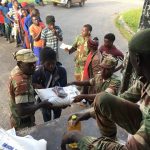 Within a year, Zimbabwe has been struck by both man-made and natural disasters – and the government’s delayed response has forced the public to take the initiative to help those affected.
Within a year, Zimbabwe has been struck by both man-made and natural disasters – and the government’s delayed response has forced the public to take the initiative to help those affected.
The latest disaster is the trail of destruction left by Cyclone Idai, which swept across Mozambique, Malawi and eastern parts of Zimbabwe.
In Zimbabwe, probably the least affected of the three countries, 11 719 people were affected, with scores of people reported dead, more than a hundred injured and over 200 missing.
Had there been a proper mitigation strategy to reduce the impacts and risks of hazards through proactive measures taken before an emergency or disaster occurs, the number of deaths, injuries and missing people would have surely been much lower.
The country’s Meteorological Service Department (MSD) raised the alarm two weeks before the tropical cyclone hit Zimbabwe. MSD director Tichaona Zinyemba warned that it would “generate torrential rains and exceedingly strong winds, resulting in flooding and destruction of infrastructure along its path”.
Armed with that knowledge – despite the limited time at hand before the disaster – schools should have been shut down and pupils sent home.
At one boarding school in particular – St Charles Luwanga High School in Manicaland – 200 pupils, teachers and supporting staff were left stranded by the storm. With no help during the first two days, they were left to fend for themselves.
Without a blueprint in place to deal with such a disaster, the Zimbabwe National Army engineers’ corps were forced to wait for water levels to subside and visibility to improve because its helicopters could not fly into the affected areas in Chimanimani.
In villages, state resources could have been used to move people to safety. With the unavailability of camps, displaced people could have been sent to relatives in less affected areas. Or public and private property could have been used as temporary transit camps – such as the Chimanimani Hotel, which led by example by taking in about 200 families.
Opposition politicians blame the ZANU-PF government for sleeping on duty. Some ZANU-PF officials have in turn been quick to rebuke the allegations. The ruling party has argued that even in developed countries, natural disasters leave a trail of death and destruction.
But a properly functioning society with efficient institutions should always have an effective civil protection unit (CPU) that is ready for inevitable disasters like Cyclone Idai.
Continued next page
(407 VIEWS)


